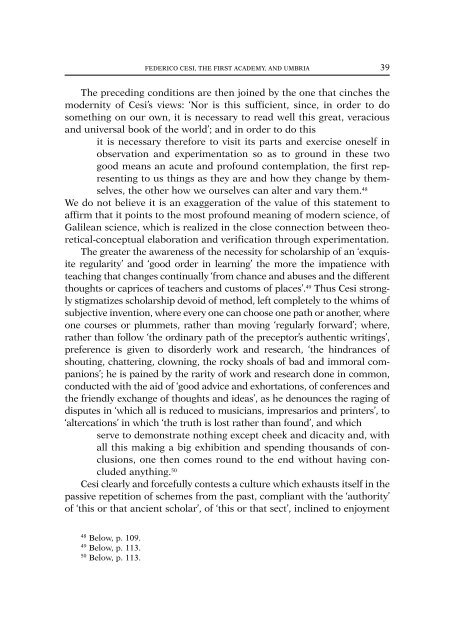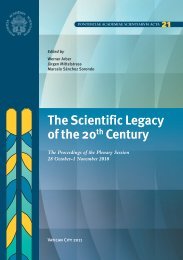FEDERICO CESI, THE FIRST ACADEMY, AND UMBRIA 39The prece<strong>di</strong>ng con<strong>di</strong>tions are then joined by the one that cinches themodernity <strong>of</strong> Cesi’s views: ‘Nor is this sufficient, since, in order to dosomething on our own, it is necessary to read well this great, veraciousand universal book <strong>of</strong> the world’; and in order to do thisit is necessary therefore to visit its parts and exercise oneself inobservation and experimentation so as to ground in these twogood means an acute and pr<strong>of</strong>ound contemplation, the first representingto us things as they are and how they change by themselves,the other how we ourselves can alter and vary them. 48We do not believe it is an exaggeration <strong>of</strong> the value <strong>of</strong> this statement toaffirm that it points to the most pr<strong>of</strong>ound meaning <strong>of</strong> modern science, <strong>of</strong>Galilean science, which is realized in the close connection between theoretical-conceptualelaboration and verification through experimentation.The greater the awareness <strong>of</strong> the necessity for scholarship <strong>of</strong> an ‘exquisiteregularity’ and ‘good order in learning’ the more the impatience withteaching that changes continually ‘from chance and abuses and the <strong>di</strong>fferentthoughts or caprices <strong>of</strong> teachers and customs <strong>of</strong> places’. 49 Thus Cesi stronglystigmatizes scholarship devoid <strong>of</strong> method, left completely to the whims <strong>of</strong>subjective invention, where every one can choose one path or another, whereone courses or plummets, rather than moving ‘regularly forward’; where,rather than follow ‘the or<strong>di</strong>nary path <strong>of</strong> the preceptor’s authentic writings’,preference is given to <strong>di</strong>sorderly work and research, ‘the hindrances <strong>of</strong>shouting, chattering, clowning, the rocky shoals <strong>of</strong> bad and immoral companions’;he is pained by the rarity <strong>of</strong> work and research done in common,conducted with the aid <strong>of</strong> ‘good advice and exhortations, <strong>of</strong> conferences andthe friendly exchange <strong>of</strong> thoughts and ideas’, as he denounces the raging <strong>of</strong><strong>di</strong>sputes in ‘which all is reduced to musicians, impresarios and printers’, to‘altercations’ in which ‘the truth is lost rather than found’, and whichserve to demonstrate nothing except cheek and <strong>di</strong>cacity and, withall this making a big exhibition and spen<strong>di</strong>ng thousands <strong>of</strong> conclusions,one then comes round to the end without having concludedanything. 50Cesi clearly and forcefully contests a culture which exhausts itself in thepassive repetition <strong>of</strong> schemes from the past, compliant with the ‘authority’<strong>of</strong> ‘this or that ancient scholar’, <strong>of</strong> ‘this or that sect’, inclined to enjoyment48 Below, p. 109.49 Below, p. 113.50 Below, p. 113.
40FEDERICO CESI, LA PRIMA ACCADEMIA, L’UMBRIAfilos<strong>of</strong>ate d’altri”, dei “frutti dell’intelletti altrui”, una cultura che finisce colridurci ad essere pigri e sterili, “filodossi” invece che autenticamente filos<strong>of</strong>i,in definitiva “privatetici”, cioè “privati veramente <strong>di</strong> scienza”. 51Denuncia, non priva <strong>di</strong> ironia, <strong>di</strong> un peripateticismo che, <strong>di</strong>mentico degliinviti del maestro, si rinchiude nella ripetizione passiva delle cose dette“dalla favorita setta e dai cari maestri”, sordo alle altre voci e alla “necessarialettione del libro dell’universo”. 52 Si tratta <strong>di</strong> una severa <strong>di</strong>agnosi deltempo, <strong>di</strong> un mondo della cultura che rivela una pr<strong>of</strong>onda incapacità adessere autonomo rispetto al passato, a fare un progetto che vada al <strong>di</strong> là <strong>di</strong>una sterile e passiva ripetizione.In questo contesto spicca la puntuale <strong>di</strong>agnosi dello sca<strong>di</strong>mento deglistu<strong>di</strong> universitari e della figura dello stesso docente, che Cesi sottopone adun impietoso atto d’accusa. I pr<strong>of</strong>essori“se pretendono o possedono pubblica lettura, procurano acquistarnome grande et authorità per conseguirla e mantenerla sempre connuovi argomenti, e la lor mira è più nel parer che nell’essere, ethaver fama <strong>di</strong> dottrina che <strong>di</strong> <strong>sapere</strong>”. 53La loro preoccupazione non è tanto quella della ricerca della verità maquella del successo e del plauso che gli proviene dagli scolari o dall’approvazionedella cultura dominante, “della setta regnante”. 54 L’asprezza dellapolemica cesiana arriva perfino ad una descrizione caricaturale del comportamentodel pr<strong>of</strong>essore universitario del tempo:“<strong>Il</strong> dar poi so<strong>di</strong>sfattione alli scolari suol affettarsi tanto per haverel’aura <strong>di</strong> benevolenza che, deposta ogni magistrale autorità, si concorracon essi a giochi, burle, trattenimenti vani, anzi, con allegribanchetti e burlevole conversazioni si ricevono e <strong>di</strong> superiore si<strong>di</strong>venga sino inferiore a quelli col andar sino a casa e condurli allalettione e poi ricondurli e simili complimenti e mo<strong>di</strong> più <strong>di</strong> corte che<strong>di</strong> stu<strong>di</strong>o e tanto alieni dall’acquisto della sapienza quanto ciascunopuol considerare”. 5551 Infra, p. 114. La persuasione antiperipatetica è senz’altro uno dei punti qualificantiil programma linceo. Un’analisi appr<strong>of</strong>on<strong>di</strong>ta dell’antiaristotelismo dei Lincei è compiutada L. Conti, Giuseppe Neri, un matematico aristotelico all’Accademia dei Lincei, Roma 1990,spec. pp. 29-54.52 Infra, p. 114.53 Infra, p. 120.54 Infra, p. 120.55 Infra, p. 120.
- Page 1 and 2: THE PONTIFICALACADEMY OFSCIENCESExt
- Page 3 and 4: Address:The Pontifical Academy of S
- Page 5 and 6: ISBN 88-7761-083-2© Copyright 2003
- Page 7 and 8: Quest’edizione del Proponimento e
- Page 9 and 10: FEDERICO CESI, LA PRIMA ACCADEMIA,
- Page 11 and 12: 10FEDERICO CESI, LA PRIMA ACCADEMIA
- Page 13 and 14: 12FEDERICO CESI, LA PRIMA ACCADEMIA
- Page 15 and 16: 14FEDERICO CESI, LA PRIMA ACCADEMIA
- Page 17 and 18: 16FEDERICO CESI, LA PRIMA ACCADEMIA
- Page 19 and 20: 18FEDERICO CESI, LA PRIMA ACCADEMIA
- Page 21 and 22: 20FEDERICO CESI, LA PRIMA ACCADEMIA
- Page 23 and 24: 22FEDERICO CESI, LA PRIMA ACCADEMIA
- Page 25 and 26: 24FEDERICO CESI, LA PRIMA ACCADEMIA
- Page 27 and 28: 26FEDERICO CESI, LA PRIMA ACCADEMIA
- Page 29 and 30: 28FEDERICO CESI, LA PRIMA ACCADEMIA
- Page 31 and 32: 30FEDERICO CESI, LA PRIMA ACCADEMIA
- Page 33 and 34: 32FEDERICO CESI, LA PRIMA ACCADEMIA
- Page 35 and 36: 34FEDERICO CESI, LA PRIMA ACCADEMIA
- Page 37 and 38: 36FEDERICO CESI, LA PRIMA ACCADEMIA
- Page 39: 38FEDERICO CESI, LA PRIMA ACCADEMIA
- Page 43 and 44: 42FEDERICO CESI, LA PRIMA ACCADEMIA
- Page 45 and 46: 44FEDERICO CESI, LA PRIMA ACCADEMIA
- Page 47 and 48: 46FEDERICO CESI, LA PRIMA ACCADEMIA
- Page 49 and 50: 48FEDERICO CESI, LA PRIMA ACCADEMIA
- Page 51 and 52: 50FEDERICO CESI, LA PRIMA ACCADEMIA
- Page 53 and 54: 52FEDERICO CESI, LA PRIMA ACCADEMIA
- Page 55 and 56: 54FEDERICO CESI, LA PRIMA ACCADEMIA
- Page 57 and 58: 56FEDERICO CESI, LA PRIMA ACCADEMIA
- Page 59 and 60: 58FEDERICO CESI, LA PRIMA ACCADEMIA
- Page 61 and 62: 60FEDERICO CESI, LA PRIMA ACCADEMIA
- Page 63 and 64: 62FEDERICO CESI, LA PRIMA ACCADEMIA
- Page 65 and 66: 64FEDERICO CESI, LA PRIMA ACCADEMIA
- Page 67 and 68: 66FEDERICO CESI, LA PRIMA ACCADEMIA
- Page 69 and 70: 68FEDERICO CESI, LA PRIMA ACCADEMIA
- Page 72 and 73: FEDERICO CESI, THE FIRST ACADEMY, A
- Page 74 and 75: FEDERICO CESI, THE FIRST ACADEMY, A
- Page 76 and 77: FEDERICO CESI, THE FIRST ACADEMY, A
- Page 78 and 79: FEDERICO CESI, THE FIRST ACADEMY, A
- Page 80 and 81: FEDERICO CESI, THE FIRST ACADEMY, A
- Page 82 and 83: FEDERICO CESI, THE FIRST ACADEMY, A
- Page 84 and 85: FEDERICO CESI, THE FIRST ACADEMY, A
- Page 86 and 87: FEDERICO CESI, THE FIRST ACADEMY, A
- Page 88 and 89: BIOGRAPHICAL NOTEFederico Cesi (158
- Page 90 and 91:
LYNCEAN RESOLUTION 1That precept, s
- Page 92 and 93:
CONDENSED LYNCEAN CONSTITUTIONS 1So
- Page 94 and 95:
CONDENSED LYNCEAN CONSTITUTIONS 93h
- Page 96 and 97:
CONDENSED LYNCEAN CONSTITUTIONS 95I
- Page 98 and 99:
CONDENSED LYNCEAN CONSTITUTIONS 97I
- Page 100 and 101:
ON THE NATURAL DESIRE FOR KNOWLEDGE
- Page 102 and 103:
ON THE NATURAL DESIRE FOR KNOWLEDGE
- Page 104 and 105:
ON THE NATURAL DESIRE FOR KNOWLEDGE
- Page 106 and 107:
ON THE NATURAL DESIRE FOR KNOWLEDGE
- Page 108 and 109:
ON THE NATURAL DESIRE FOR KNOWLEDGE
- Page 110 and 111:
ON THE NATURAL DESIRE FOR KNOWLEDGE
- Page 112 and 113:
ON THE NATURAL DESIRE FOR KNOWLEDGE
- Page 114 and 115:
ON THE NATURAL DESIRE FOR KNOWLEDGE
- Page 116 and 117:
ON THE NATURAL DESIRE FOR KNOWLEDGE
- Page 118 and 119:
ON THE NATURAL DESIRE FOR KNOWLEDGE
- Page 120 and 121:
ON THE NATURAL DESIRE FOR KNOWLEDGE
- Page 122 and 123:
ON THE NATURAL DESIRE FOR KNOWLEDGE
- Page 124 and 125:
ON THE NATURAL DESIRE FOR KNOWLEDGE
- Page 126 and 127:
ON THE NATURAL DESIRE FOR KNOWLEDGE
- Page 128 and 129:
ON THE NATURAL DESIRE FOR KNOWLEDGE
- Page 130 and 131:
ON THE NATURAL DESIRE FOR KNOWLEDGE
- Page 132 and 133:
ON THE NATURAL DESIRE FOR KNOWLEDGE
- Page 134 and 135:
ON THE NATURAL DESIRE FOR KNOWLEDGE
- Page 136 and 137:
ON THE NATURAL DESIRE FOR KNOWLEDGE
- Page 138 and 139:
ON THE NATURAL DESIRE FOR KNOWLEDGE
- Page 140 and 141:
ON THE NATURAL DESIRE FOR KNOWLEDGE
- Page 142 and 143:
ON THE NATURAL DESIRE FOR KNOWLEDGE
- Page 144 and 145:
ON THE NATURAL DESIRE FOR KNOWLEDGE
- Page 146 and 147:
ON THE NATURAL DESIRE FOR KNOWLEDGE
- Page 148 and 149:
ON THE NATURAL DESIRE FOR KNOWLEDGE
- Page 150 and 151:
ON THE NATURAL DESIRE FOR KNOWLEDGE
- Page 152 and 153:
ON THE NATURAL DESIRE FOR KNOWLEDGE
- Page 154 and 155:
ON THE NATURAL DESIRE FOR KNOWLEDGE
- Page 156 and 157:
ON THE NATURAL DESIRE FOR KNOWLEDGE
- Page 158:
ON THE NATURAL DESIRE FOR KNOWLEDGE
















